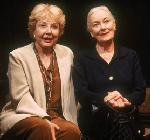SEARCH CurtainUp
REVIEWS
FEATURES
NEWS (Etcetera)
ADDRESS BOOKS
Broadway
Off-Broadway
BOOKS and CDs
OTHER PLACES
Berkshires
London
Los Angeles
Philadelphia
Elsewhere
QUOTES
On TKTS
LETTERS TO EDITOR
FILM
LINKS
MISCELLANEOUS
Free Updates
Masthead
NYC Weather
All Over
by Les Gutman
|
Death is such an old disease. ---The Doctor |

M. Learned and R. Harris
(Photo: Joan Marcus) |
This being Albee, the play about life (which recently received a splendid production at The Hartford Stage) just might be about eternity, and the one about death ends as the grim reaper arrives. The playwright's concern is that we approach death with semantic precision. So as the play opens on an unidentified famous man's deathwatch, The Wife (Rosemary Harris) and The Mistress (Michael Learned) are not having the sort of cat fight one might expect but rather an oddly respectful discussion about the dying man's feelings about the use of the verb "to be" in connection with death. Later, The Nurse (Myra Carter) will weigh in, drawing a distinction between death and the act of dying.
I might be inclined to call the play "Sitting at Death's Door". For the play's two hour duration, its stars spend most of their time sitting, and talking. (Ms. Harris spends the first third of the second act sleeping on a rather grand chaise in Thomas Lynch's fastidiously designed New York townhouse.) The discourse has a rather narrow range, each character assessing his or her own life and most everyone else's. The relationship of The Wife with her grown two children, The Daughter (Pamela Nyberg) and The Son (Patrick Garner), is doused with the animosity we expect of Albee, whereas that with The Mistress suggests a far greater degree of reconciliation. (Their only major difference is over the disposition of the man's body: "flame or worms," in The Wife's formulation.) We will also hear from The Doctor (Bill Moor), himself an old man whose life is about over, and the dying man's Best Friend (not a dog but John Carter), who among other things reflects on life causa mortis -- in contemplation of death, an Albee thematic strain. It's not that Albee lacks anything to say, mind you, but neither he nor director Emily Mann arranges for much more than talk. Like people, it gets old.
Rosemary Harris is always an attraction, and she couldn't be more aptly cast. But there is not a lot of flexing of her actorly muscles here, at least not until very late in the play when she has a meltdown as the reality of her erstwhile husband's demise takes hold. Notwithstanding, we can appreciate the restraint in her performance. Ms. Learned is quite fine as the other woman, and has quite a bit more of a dramatic nature to execute, but of the older women, it is Myra Carter who steals the show, with a superbly eccentric rendition of The Nurse -- wise, wacky and oblivious to the custom of the staid household. Pamela Nyberg's portrayal of The Daughter is more routine, although she pivots well between the woman into which she has evolved -- flaws showing -- and the woman her mother might have her be.
Patrick Garner is believable as the son, so beaten down by the benchmark set by his father and his mother's constant berating that he seemingly has nowhere to go. John Carter looks perfect as the husband's contemporary and colleague, though he seems to leave something on the table in what could be a more contemplative role. Mr. Moor, on the other hand, succeeds in mining The Doctor for all of the depth with which the character is written.
No one will mistake All Over for one of Albee's great plays, and it may be the only one that's better read than seen. Nonetheless, it leaves us with plenty to think about, even if, as is anticipated with Albee, it might be stuff we'd rather neglect.
LINKS
CurtainUp's Playwright Album on Edward Albee
|
All Over
by Edward Albee Directed by Emily Mann starring Rosemary Harris and Michael Learned with John Carter, Myra Carter, Patrick Garner, Bill Moor, Pamela Nyberg, Richard Cottrell, Keith Dixon and Chuck McMahon Set design: Thomas Lynch Costume Design: Jennifer von Mayrhauser Lighting Design: Allen Lee Hughes Running Time: 2 hours, 5 minutes with one intermission Gramercy Theatre, 127 East 23rd St. (Park/Lexington Avs.) Telephone (212) 307-4100 Opening June 27, 2002, closes September 1, 2002 TUES - SAT @7:30, WED, SAT - SUN @2; $55 Reviewed by Les Gutman based on 7/3/02 performance |

6,500 Comparative Phrases including 800 Shakespearean Metaphors by CurtainUp's editor.
Click image to buy.
Go here for details and larger image.



